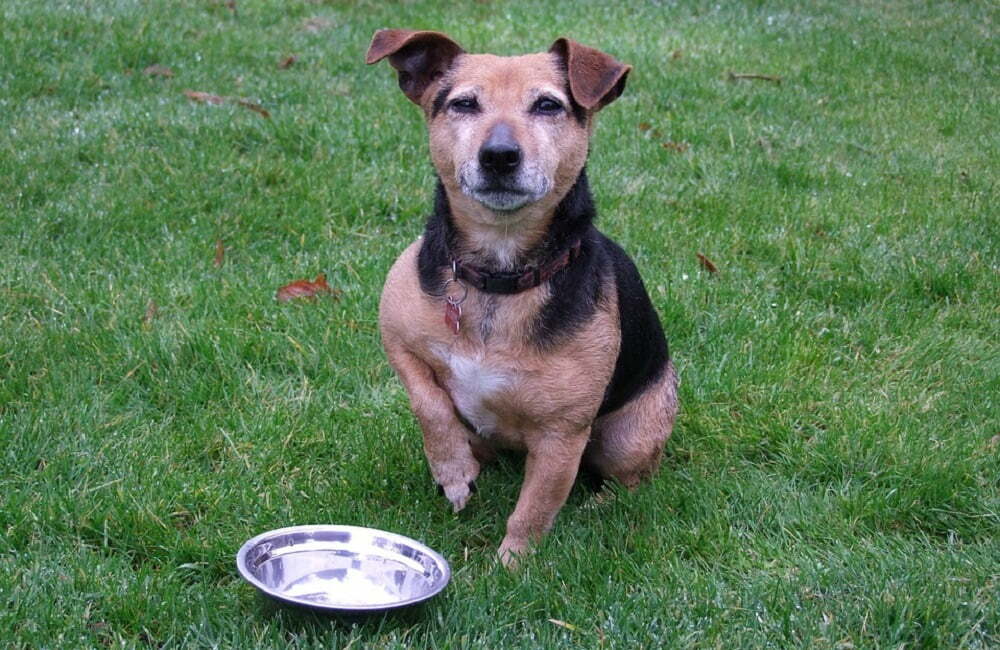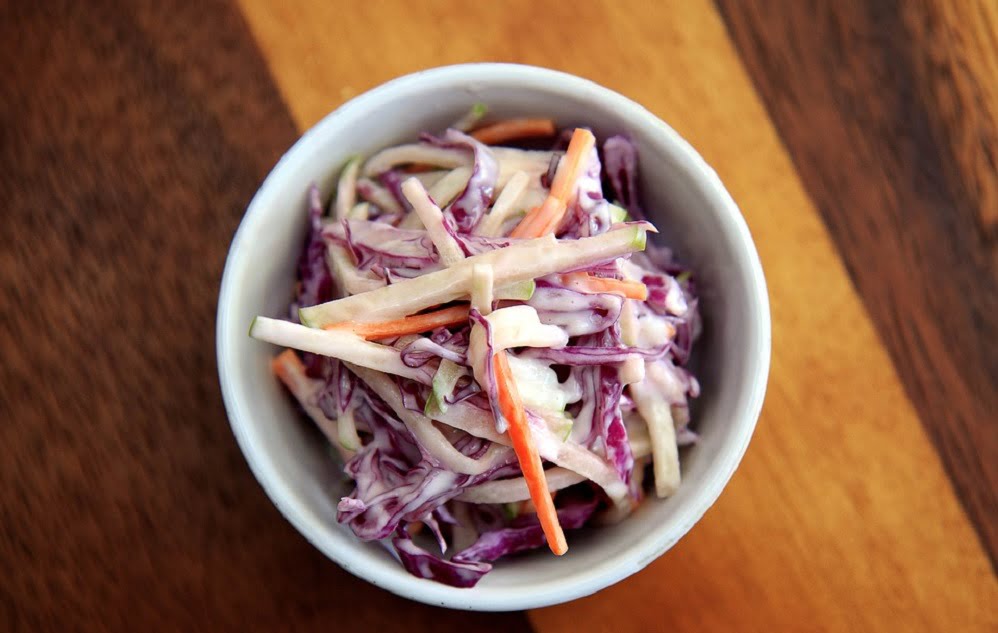The diet of a dog is pretty straightforward. As long as they are getting fed regularly with food that contains all of their essential nutrients (as well as the odd treat) they will be happy.
However, it is no secret that many dogs (in fact every single dog I have ever met) will eat whatever they can get their paws on. This often includes human food… And if you are anything like us, you find it difficult to resist those puppy dog eyes when your dog is begging for a bit of your dinner.
Now, there are, of course, some human foods that are perfectly safe for dogs and can be fed in abundance. Others are fine as occasional treats, and then some foods should never be given to dogs as they may make them very ill.
This means that deciding whether food is safe for your dog can be tricky. One food that we get asked about a lot is coleslaw.
After all, coleslaw is made up of a number of different ingredients, some of which are fine for a dog. In this article, we will be exploring what exactly is in coleslaw and assessing whether it should be fed to your furry friend.
We will also be looking at one ingredient of coleslaw in particular which is actually toxic for your dog. So, if you have ever wondered about giving coleslaw to your pooch, this is the article for you.

Can dogs have coleslaw?
No. we do not recommend that your dog is fed coleslaw.
We are sure that this is not the answer you want to hear, especially if your dog is giving you puppy dog eyes and begging for a taste of that creamy, crunchy goodness.
However, coleslaw is not recommended to be given to dogs for a number of reasons. Sure, there are some ingredients in coleslaw that are great for dogs, such as the carrot and cabbage.
However, the other components of coleslaw are less suitable for the diet of our furry four legged friends! Keep on reading to find out more about the ingredients in coleslaw, and what exactly is in coleslaw that could potentially make your dog very ill!
What is in coleslaw?
Coleslaw contains a variety of ingredients and components that may vary depending on whether the coleslaw is homemade, store-bought, or served at a restaurant.
Typically it consists of a creamy sauce such as mayonnaise, cream, crunchy grated raw carrots, chopped raw cabbage, and chopped raw onions.
The latter two are often very thinly sliced and rarely cooked. It is generally white onion and cabbage that is used but you may also find that it can be made using red onion and red (or purple) cabbage.
There may also be lots of salt, sugar, oil, vinegar, and other additives in the recipe, depending on where the coleslaw comes from.
It can be more difficult to know the exact ingredients if you are eating coleslaw in a store. In comparison, if you make it yourself, you have total control over what goes inside.
Why shouldn’t your dog eat coleslaw?
Your dog shouldn’t eat coleslaw because there is really no nutritional benefit that they can gain from it.
Sure, carrots and cabbage may be healthy and full of nutrients, but because they are only small components of coleslaw, there are not enough of each of them for it to have a positive effect on your dog.
As well as this, some ingredients in coleslaw can make your dog unwell, such as mayonnaise, cream, and raw cabbage.
That’s right! These ingredients can cause sickness and diarrhea in your pooch.
Of course, mayonnaise and cream are a given – dogs are not meant to have high fat ingredients such as mayonnaise or dairy such as cream.
Perhaps most surprising is the raw cabbage. Cabbage is healthy for dogs and can provide many health benefits, but raw cabbage can cause gas and painful wind, especially in large amounts. Keep on reading to find out more about the effect of cabbage on dogs later in the article.
Another reason why dogs can’t have coleslaw is that some ingredients may even turn out to be toxic for your dog.
We will be exploring these particular toxic ingredients in more detail later on in the article.
However, for now, suffice to say that the reasons why your dog shouldn’t eat coleslaw are numerous. They would be eating pointless calories for no health benefit.
Why is coleslaw toxic to dogs?
The reason why coleslaw is toxic to dogs lies in one particular ingredient and a very important component of coleslaw. You may have guessed by now, especially if you are aware of some of the most toxic foods for dogs. It is, of course, onion.
Onion features in almost every coleslaw recipe we know, whether homemade, restaurant served, or store-bought! Whilst this may be a delicious addition in the opinion of humans, for dogs it can make them sick and is potentially toxic, even causing death in large amounts.
Onions are members of the Allium family. This also contains garlic, green onions, and leeks. When eaten, even in quite small quantities, these foods can be lethal to dogs, causing kidney issues, vomiting, diarrhea, and even death.
Of course, the quantity of onions in coleslaw is not likely to be huge. However, it is not worth risking it, as even a small amount of onions can be enough to make small dogs very ill (and even large dogs if they eat enough of it!).
What can happen to my dog if it eats coleslaw?

If your dog has eaten any amount of coleslaw, big or small, we truly think that it is best to err on the side of caution and get into contact with your vet. We don’t mean that you need to rush them down there, especially if they have only eaten a small amount.
However, we do think that it is good to seek professional advice as the vet can tell you about any possible side effects to look out for.
Be prepared for stomach related issues such as vomiting, diarrhea, and your dog experiencing a painful tummy. They may also be passing loud (and smelly) wind so be prepared for this.
If you are ever in any doubt at all, we recommend taking your dog straight to the vet, especially if they have eaten a large quantity of coleslaw that contains onions. In most cases, we are sure that your dog will be absolutely fine. However, it is always best to err on the side of caution when it comes to our furry friend’s health!
Can dogs eat mayonnaise?
In theory, a dog may be able to eat a small amount of mayonnaise. Nothing bad is likely to happen as there is nothing in mayonnaise that is particularly harmful, or worse still, toxic, for your dog. However, that is not to say that they should eat mayonnaise.
Just as coleslaw has next to no nutritional benefit for your dog, mayonnaise has even less nutritional benefits. It is made from an emulsion of oil, eggs, and vinegar.
None of these is particularly vital for your dog’s diet, and due to the high fat content of mayonnaise, it can cause excess weight gain, and diseases related to excess weight in your dog.
If your dog is particularly intolerant of fats (which many dogs are) then mayonnaise may cause some sickness and diarrhea. As such, it should be avoided.
That being said, if your dog does happen to eat some mayonnaise, try not to panic. Just monitor them and they will likely be fine.
Is Cabbage harmful to dogs?
No, cabbage is not generally harmful to dogs. In fact, in small portions, this key component of coleslaw can be very beneficial to the health of your four pawed pooch!
The reason for this is because it is a leafy green vegetable (also known as a cruciferous vegetable for you veggie boffins out there).
Leafy greens are, as you may know, fantastic components to the diet of us humans as they provide many vitamins and nutrients such as fiber, vitamin K, and even vitamin C (hey, this doesn’t mean that you should start munching coleslaw by the gallon!). They also provide these same benefits to dogs, and as such can be fed to dogs in small doses.
That being said, we want to clarify that too much cabbage can have an adverse reaction in dogs as it can cause a build-up of gas.
This is especially true if fed to a dog that has a sensitive stomach anyway, as it may cause a bout of diarrhea.
Feed cabbage to your dog in small portions, and do not be tempted to feed them coleslaw just because it has a small amount of cabbage in it.
